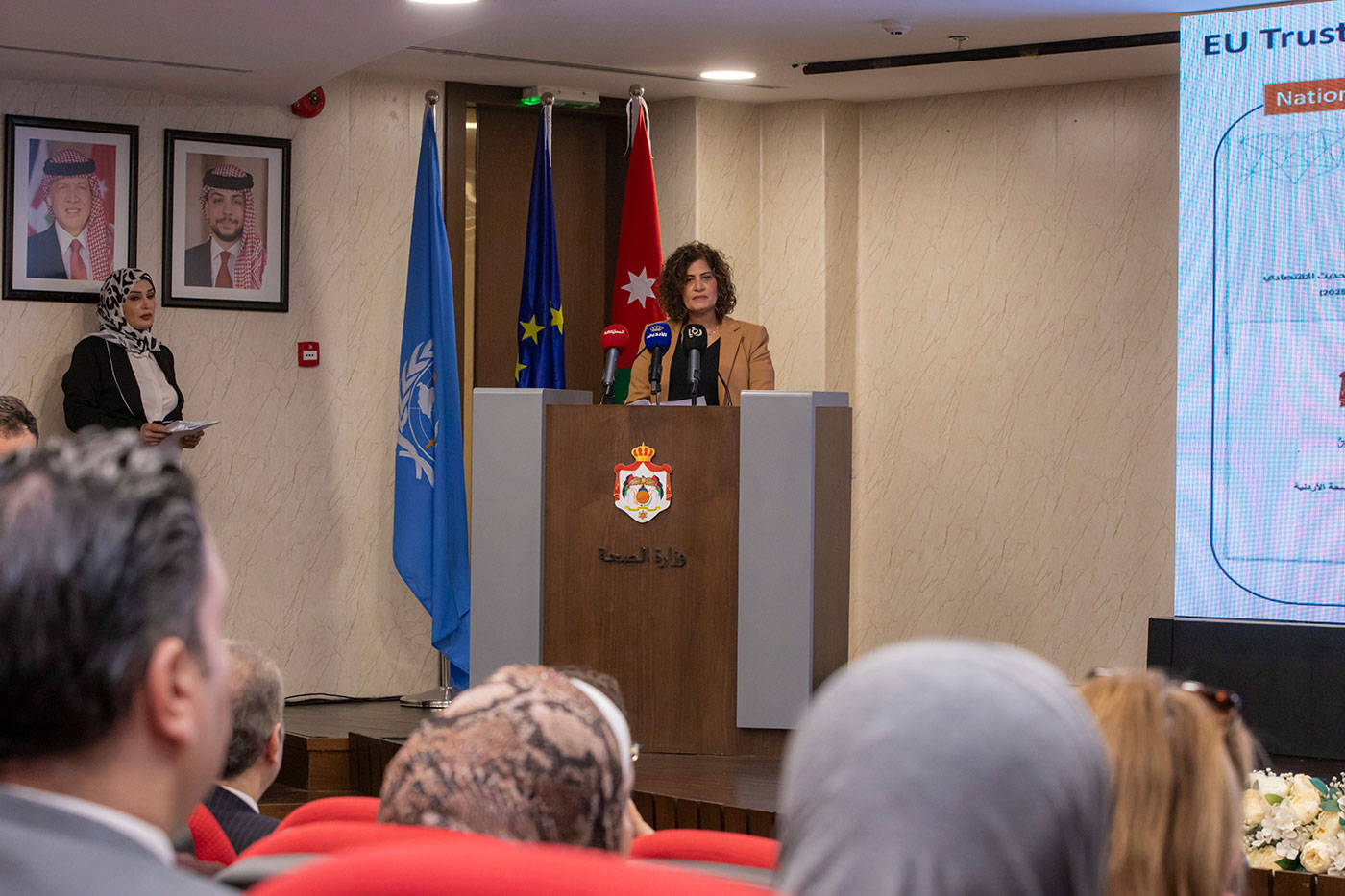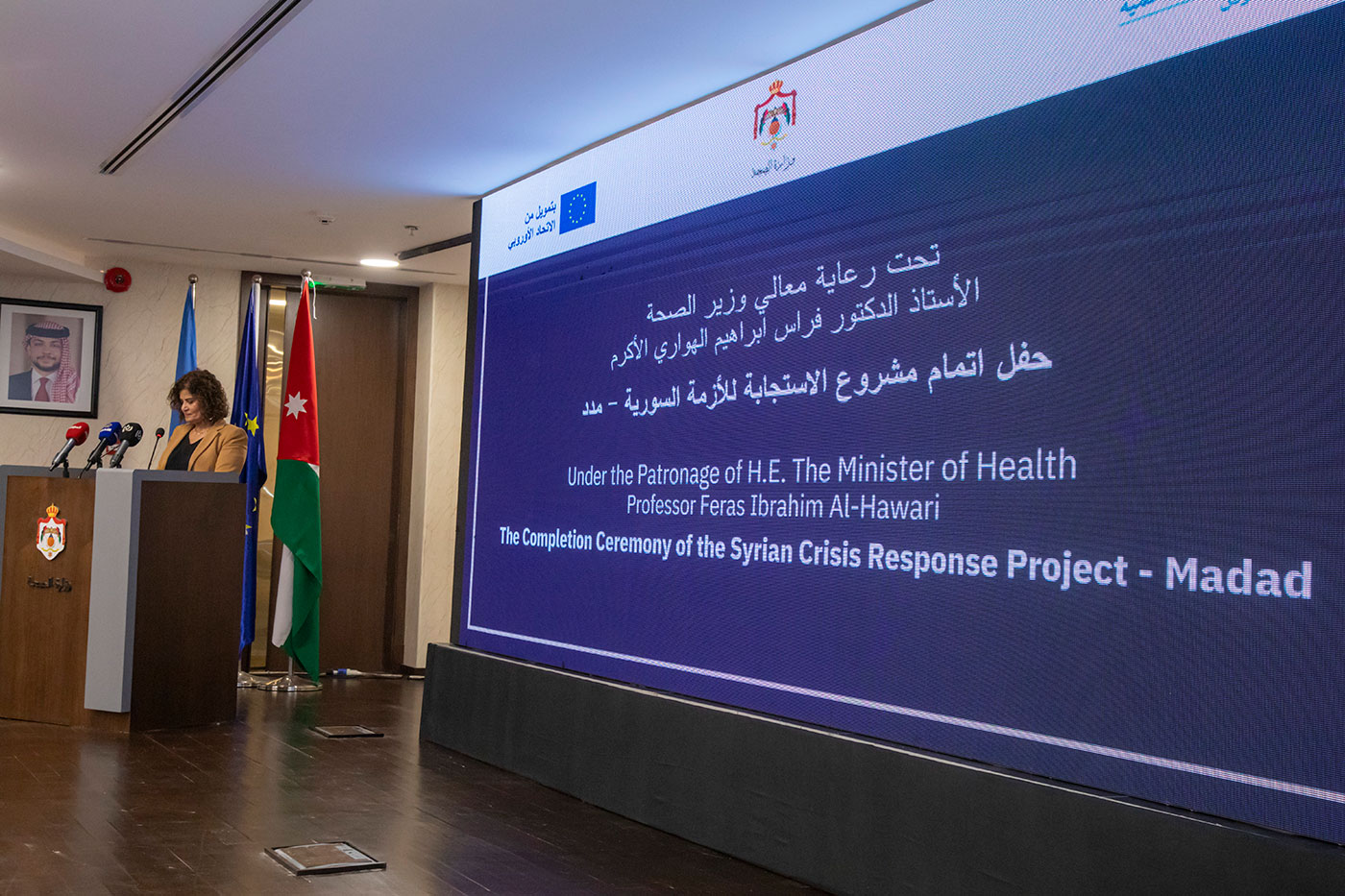 24 March 2025, Amman, Jordan – The Ministry of Health, in partnership with the World Health Organization (WHO) and the European Union (EU), celebrated the successful conclusion of the Syrian Crisis Response Project/Madad. The initiative, funded by the EU, has played a pivotal role in strengthening Jordan’s health care system over the last 5 years.
24 March 2025, Amman, Jordan – The Ministry of Health, in partnership with the World Health Organization (WHO) and the European Union (EU), celebrated the successful conclusion of the Syrian Crisis Response Project/Madad. The initiative, funded by the EU, has played a pivotal role in strengthening Jordan’s health care system over the last 5 years.
The closing ceremony brought together representatives from the Government of Jordan, the health sector, civil society organizations, academia, the UN and international partners, providing an opportunity to reflect on the project’s achievements and lasting impact on health care in Jordan.
Strengthening health care access and immunization
With a total investment of €43 million, the project enhanced primary health care services, ensuring improved access to vaccinations for Syrian refugees and host communities. Millions of doses of routine vaccines were administered.
Jordan’s immunization programme received a substantial boost through the construction of a modern regional vaccine storage facility in Irbid and the solar-powered national vaccine warehouse. Four new cold rooms and 380 vaccine refrigerators were provided to expand storage capacity and facilitate the introduction of new vaccines.
Building a resilient medical supply chain
To strengthen Jordan’s ability to manage and distribute medical supplies, the project supported the establishment of 3 warehouses in Amman and Zarqa and the renovation of 10 regional storage facilities in Irbid and Ma’an. Enhancements included a new medical transport unit, equipped with 24 refrigerated trucks provided by WHO, to ensure medicines and vaccines reach beneficiaries in optimal condition. Supply chain management and storage good practice capacities were strengthened at both the national and subnational level.
Enhancing health system governance and financing
In addition to strengthening infrastructure, the Project supported health policy development and strategic financing. Key contributions include:
the development of Jordan’s universal health coverage roadmap;
technical support for the Ministry of Health’s 2023–2025 strategy;
the formulation of a universal health coverage benefits package; and
the strengthening of health economics and financing with reports such as the National Health Accounts (2018–2022) and the Health Financing System Report.
A stronger health system for the Future
 Minister of Health Professor Feras Hawari highlighted the Project’s impact on Jordan’s immunization efforts and crisis response: "The Project has strengthened Jordan’s health infrastructure, expanded our national vaccination programme and provided millions of doses to children. It enhanced our capacity to respond to crises like COVID-19 by securing vaccines, medicines and essential medical supplies. The modern vaccine storage in Irbid and strategic medical warehouse in Zarqa means we are better prepared for the future – protecting both citizens and refugees.”
Minister of Health Professor Feras Hawari highlighted the Project’s impact on Jordan’s immunization efforts and crisis response: "The Project has strengthened Jordan’s health infrastructure, expanded our national vaccination programme and provided millions of doses to children. It enhanced our capacity to respond to crises like COVID-19 by securing vaccines, medicines and essential medical supplies. The modern vaccine storage in Irbid and strategic medical warehouse in Zarqa means we are better prepared for the future – protecting both citizens and refugees.”
EU Ambassador to Jordan Pierre-Christophe Chatzisavas said: “As the Project ends, its impact will continue through the substantial expansion of immunization coverage across Jordan, particularly benefiting vulnerable Jordanians and Syrian refugees. The EU is proud to have been part of this important initiative which has played a crucial role in bolstering the nation's ability to respond effectively to health emergencies and challenges. Furthermore, it has significantly improved the medical supply chain by modernizing and rehabilitating 10 regional warehouses and constructing 4 new facilities, which are vital to Jordan's continued progress towards achieving universal health coverage for all.”
WHO Regional Director for the Eastern Mediterranean Dr Hanan Balkhy stressed how the programme “has significantly improved access to immunization services for both refugees and Jordanians, while supporting nationwide improvements in supply chain management and integrated health systems governance”.
“It has been a win-win for both refugees and Jordanians: better immunization coverage, better disease surveillance and better government capacity to serve Jordan’s population.”
“At WHO, we leverage our expertise and evidence-based solutions to turn health challenges into opportunities,” said WHO Representative to Jordan Dr Jamila Al-Raiby. “In collaboration with the Ministry of Health and the EU, we have enhanced access to high-quality vaccinations, strengthened the medical supply chain, supported sustainable health financing, enhanced health emergency preparedness and improved disease surveillance systems.”
“The Project is a powerful example of how collaborative partnerships drive tangible impact, ensuring that everyone, everywhere receives the health care they deserve.”
Sustaining the achievements
As Jordan moves forward, the Ministry of Health reaffirmed its commitment to maintaining the gains and further strengthening the national health system.
The success of the Syrian Crisis Response Project serves as an example of how strategic partnerships can deliver sustainable health solutions and help ensure that no one is left behind.
WHO urges continued global investment in strong health care infrastructure to support universal access to essential health services.


